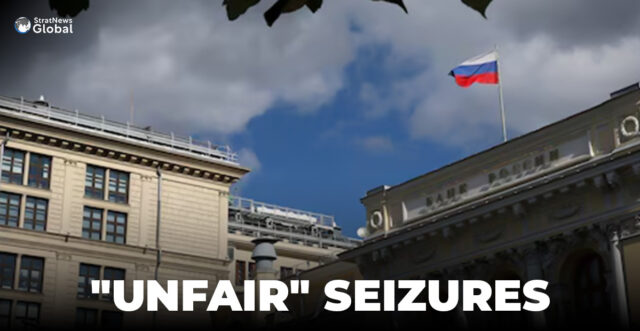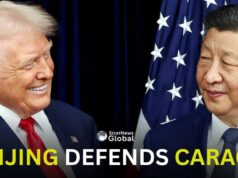In a rare rebuke of the Kremlin’s growing control over private enterprise, Russia’s central bank has determined that the state violated minority shareholders’ rights in several recent asset takeovers linked to the Ukraine conflict, sources told Reuters.
The move marks the first visible pushback from within Russia’s elite against the sweeping nationalisation drive that has seen tens of billions of dollars in foreign and domestic assets seized.
But within parts of the Russian elite, there are signs of a backlash, especially among market-friendly technocrats who are credited with saving the Russian economy from collapse amid the toughest sanctions ever imposed on a major economy.
Some business executives and central bank and finance ministry officials are questioning what they see as a move to a Soviet-style command structure, with all resources mobilised towards achieving military victory in Ukraine, the sources said.
Three sources close to the central bank and the Moscow Stock Exchange told Reuters that MOEX had officially complained to the central bank over the alleged violation of the law by the government after seizing a majority stake in gold miner UGC.
Seizing Private Property
Although the complaint did not question the seizure itself, the central bank ruled that the state had failed to make an obligatory buyout offer to shareholders in a public company and asked the state property agency to execute the offer.
“The state’s actions in the UGC case are undermining the last semblance of private property rights in Russia,” one source with knowledge of discussions, who spoke on condition of anonymity due to the sensitivity of the situation, told Reuters.
The Moscow Stock Exchange and the finance ministry declined to comment on the issue.
The source said that the state de-facto devalued the stakes of private investors who purchased shares on the open market and have no connection to the court case against the company, nor links to the previous billionaire owner Konstantin Strukov.
“I take it that when a nationalisation of property is taking place the law does not work,” Oleg Kuzmichev, a private investor in UGC shares, told Reuters.
‘Who Will Buy Shares After This?’
UGC held one of the biggest initial public offerings in Russia in 2023, positioning itself as a safe-haven bet on gold in turbulent times when foreign capital fled Russia. About 10% of the company’s shares are held by Russian retail investors.
“How can you convince anyone to buy shares after this? The long-term harm to the economy from such actions far exceeds the benefits from whatever billions they are seizing,” the source said.
Lawyer Karim Fayzrakhmanov from Forward Legal confirmed to Reuters that a Russian law on joint-stock companies requires new holders of stakes exceeding 30% to make a buyout offer within 35 days of an ownership change with no exceptions for the state.
Russian authorities have seized assets worth around $50 billion since the start of Moscow’s “special military operation” in Ukraine, including the assets of fleeing Western companies such as French food maker Danone and Danish brewer Carlsberg.
Besides the Western assets, major domestic companies have changed hands on the basis of including corruption claims, alleged privatisation violations, or poor management.
The nationalisations have marked the biggest property redistribution since the 1990s, when Soviet state assets were sold off to private investors at bargain prices. The drive to seize private property had so far met little domestic opposition.
Weighing On Stock Exchange
President Vladimir Putin earlier asked regulators to ensure that more companies sell their shares on the market at a time when debt is expensive and the economy is slowing down, partly due to lack of capital for investment.
But the UGC controversy has sharpened concerns among some in Moscow about the feasibility of more companies going public.
Sergei Shvetsov, MOEX board chairman and a former first deputy governor of the central bank, expressed rare public criticism.
“The state must first and foremost follow the rules it sets. Right now, it doesn’t, especially when it comes to public companies in which it holds a stake,” Shvetsov told a financial forum in Moscow.
He said that the way the Russian state handles public companies contributes to a so-called “Russian discount” that, combined with lower interest rates, is weighing on the Russian stock index, which is down about 30% since the start of 2022.
Accelerated Sales
However, one of the sources said, there is no budgeted money for such a buyout, while lengthy valuation and due diligence procedures are delaying privatisation of seized assets.
One possible solution would be to sell seized assets quickly, shifting the buyout offer responsibility to new owners. The sources added that a new decree by Putin on accelerated property sales should help.
The day after the decree was published, secretive copper producer UMMC emerged as the likely buyer of the seized stake in UGC, which the finance ministry is aiming to sell by the end of October for 100 billion roubles ($1.23 billion).
The central bank’s first deputy chairman, Vladimir Chistyukhin, who oversees financial markets, echoed Shvetsov, warning that the current approach to property rights would deter foreign investors even after any peace in Ukraine is secured.
“It is necessary that by that time, all the disruptions we have had with a number of state decisions regarding individual corporations are resolved,” he said.
($1 = 82.0000 roubles)
(With inputs from Reuters)





